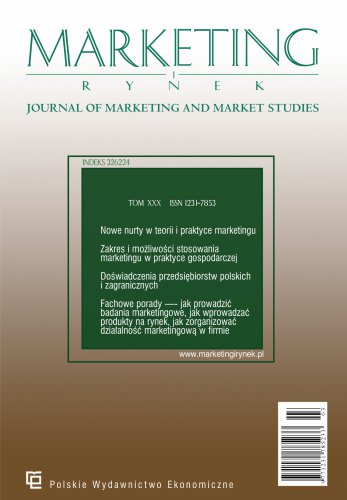The importance of knowledge in improving the efficiency of innovative activities of enterprises
The aim of the publication is to analyze and critically evaluate the selected literature and propose a new concept of knowledge management and innovation management based on the integration of these two functional areas into one systemic whole. To achieve this goal, research methods were used, such as: critical-cognitive analysis of selected literature, the descriptive and comparative method, and the projective method. These methods enabled a critical interpretation of key concepts such as: knowledge, its types, knowledge management; innovation, its types, innovation management. On the other hand, the projection method was used to develop and present original definitions: knowledge, knowledge management, innovation, innovation management, and to propose a model for integrating efficient knowledge management and innovation activity management. The indicated structural elements of the article determine its originality. They have significant cognitive and practical values for the managerial staff, enabling (after their application) a systemic transformation of a traditional enterprise into an innovative, knowledge-based, learning enterprise.
References
Bibliografia/References
Baruk, J. (2011). Wiedza w procesach tworzenia innowacji. Organizacja i Kierowanie, (4). 113–127.
Baruk, J. (2018). Wiedza i innowacje jako czynniki rozwoju organizacji – podejście zintegrowane. Marketing Instytucji Naukowych i Badawczych, 29(3), 83–110. https://10.14611/MINIB. 29.09.2018.05
Baruk, J. (2020). Zarządzanie innowacjami ukierunkowane na współtworzenie wartości w ramach partnerskich relacji. Marketing i Rynek, (5), 3–14. https://10.33226/1231-7853.2020.5.1
Baruk, J. (2022). Racjonalizacja zarządzania innowacjami – koncepcje modelowe. Marketing i Rynek, (5), 10–23. https://10.33226/1231-7853.2022.5.2
Bay, M., & Cil, U. (2016). Haw well do companies manage innovation? An analysis on low-tech industries. Procedia – Social and Behavioral Sciences, 235, 709–718. https://10.1016/j.sbspro.2016.11.072
Britannica. (b.r.). https://www.britannica.com/dictionary/knowledge (dostęp: 08.12.2022).
Chang, Ch.-Y., Chang, Y.-Y., Tsao, Y.-CH., & Kraus, S. (2022). The power of knowledge management: How top management team bricolage boosts ambidexterity and performance. Journal of Knowledge Management, 26(11), 188–213. https://10.1108/JKM-10-2021-0753
Clarke, Th. (2001). The knowledge economy. Education + Training, 43(4/5), 189–196. https://doi.org/10.1108/00400910110399184
Czakon, W. (2020). Krótkowzroczność strategiczna menedżerów. Wydawnictwo Uniwersytetu Jagielońskiego.
Davenport, T. H., & Prusak, L. (2005). What do we talk about when we talk about knowledge?. http://a-small-lab.com/resources/data-informationknowledge, 301–321 (dostęp: 08.12.2022).
Du Preez, N. D., & Louw, L. (2008). A framework for managing the innovation process. „PICMET” 08-2008 Portland International Confrence on Management of Engineering & Technology, 546–558. https://10.1109/PICMET.2008.4599663
Edvinsson, L., & Malone, M. S. (2001). Kapitał intelektualny. Wydawnictwo Naukowe PWN.
Encyklopedia zarządzania. (b.r.) https://mfiles.pl/pl/index.php/Sprawno%C5%9B%C4%87 (dostęp: 19.12.2022).
Eurostat (b.r.). https://ec.europa.eu/eurostat/web/main/data/database (dostęp: 02.12.2022).
Fallatah, M. I. (2019). Knowledge workers mobility in innovative organizations: The role of individual differences. International Journal of Business and Management, 14(9), 23–35. https://10.5539/ijbm.v14n9p23
Girard, J. P. (2006). Where is the knowledge we have lost in managers? Journal of Konwledge Management, 10(6), 22–38. https://10.1108/13673270610709198
Griffin, R. W. (2009). Podstawy zarządzania organizacjami. Wydawnictwo Naukowe PWN.
Grudzewski, W. M., & Hejduk, I. (2005). Zarządzane wiedzą w organizacjach. E-mentor, 1(8). https://www.e-mentor.edu.pl/artykul/index/numer/8/id/115 (dostęp: 04.01.2023).
Gupta, A., Singh, R. K., Kamble, S., & Mishra, R. (2022). Knowledge management in industry 4.0 environment for sustainable competitive advantage: A strategic Framework. Knowledge management Research & Practice, 20(6), 878–892. https://doi.org/10.1080/14778238.2022.2144512
GUS. (2020). Podręcznik Oslo 2018. Urząd Statystyczny w Szczecinie.
GUS. (2022). Działalność innowacyjna przedsiębiorstw w Polsce w latach 2019–2021. Informacje sygnalne. Urząd Statystyczny w Szczecinie.
Hajric, E. (2018). Knowledge management. System and practices. A theoretical and practical guide for knowledge management in your organization. Knowledge_Management_A_Theoretical_And_Practical_Guide_Emil_Hajric(PDF).pdf
https://tok2022.com/what-is-knowledge/ (dostęp: 09.12.2022).
Kowalczyk, A., & Nogalski, B. (2007). Zarządzanie wiedzą. Koncepcja i narzędzia. Difin.
Nonaka, I., & Takeuchi H. (2000). Kreowanie wiedzy w organizacji. Poltext.
Nurulin, Y., Skvortsova, I., Tukkel, I., & Torkkeli, M. (2019). Role of knowledge in management of innovation. Resources, 8(87), 1–12. www.mdpi.com/journal/resources. https://doi.org/10.3390/resources8020087
Öberg, Ch., & Lundberg, H. (2022). Mechanisms of knowledge development in a knowledge ekosystem. Journal of Knowledge Management, 26(11), 293–307. https://10.1108/JKM-11-2021-0814
OECD/Eurostat. (2018). Oslo Manual 2018. Guidelines for collecting, reporting and using data on innovation. OECD Publishing. https://doi.org/10.1787/9789264304-en
Okwemba, E. (2018). Influence of knowledge management capabilities on performance of telecommunication companies in Kenya. International Journal of Business and Management Invention, 7(6), 16–21.
Perez, J. R., & Ordonez de Pablos, P. (2003). Knowledge management and organizational competitiveness: A frame work for human capital analysis. Journal of Knowledge Management, 7(3), 82–91. https://doi.org/10.1108/13673270310485640
Peters, Th. J., & Waterman, R. H. (2000). Poszukiwanie doskonałości w biznesie. Wydawnictwo Medium.
Potocki, A. (2011). Komunikacja jako proces zarządzania wiedzą. W: A. Potocki (Red), Komunikacja w procesach zarządzania wiedzą (33–57). Uniwersytet Ekonomiczny w Krakowie, Fundacja Uniwersytetu Ekonomicznego w Krakowie.
Prahalad, C. K., & Ramaswamy, V. (2005). Przyszłość konkurencji. PWE.
Probst, G., Raub, S., & Romhardt, K. (2004). Zarządzanie wiedzą w organizacji. Oficyna Ekonomiczna.
Radević, I., Dimovski, V., Lojpur, A., & Colnar, S. (2021). Quality of healthcare services in focus: The role of knowledge transfer, hierarchical organizational structure and trust. Knowledge Management Research & Practice, 21(3), 1–12. https://doi.org/10.1080/14778238.2021.1932623
Sokoh, G. Ch., & Okolie, U. Ch. (2021). Knowledge management and its importance in modern organizations. Journal of Public Administration, Finance and Law, (20), 283–300. https://doi.org/10.47743/jopafl-2021-20-19
Stabryła, A. (2015). Koncepcja zarządzania wiedzą i rozwojem przedsiębiorstwa. Zeszyty Naukowe Małopolskiej Wyższej Szkoły Ekonomicznej w Tarnowie, 26(1), 169–178.
Świadek, A. (2021). Krajowy system innowacji. CeDeWu.
Tidd, J., & Bessant, J. (2013). Zarządzanie innowacjami. Integracja zmian technologicznych, rynkowych i organizacyjnych. Oficyna. A Wolters Kluwer business.
Wang, T.-Ch., & Chen, M.-F. (2017). Perceiving organisational culture influence on knowledge management performance. Science Journal of Business and Management, 5(3), 96–100. https://doi.org/10.11648/j.sjbm.20170503.11

